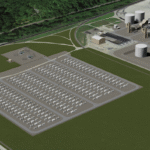Introduction
When it comes to renewable energy sources, two options that are often considered are hydropower and solar energy. Both have their advantages and disadvantages, and which one is better ultimately depends on the specific situation. In this article, we’ll explore the benefits and drawbacks of each, helping you make an informed decision about which one is best for your needs.
Hydropower
How it Works
Hydropower is a form of renewable energy that uses the movement of water to generate electricity. This is typically done through the construction of dams, which harness the energy of flowing water and convert it into electrical power. The process is relatively simple: water is collected behind a dam, and then released through a turbine, which spins a generator to produce electricity.
Benefits
Hydropower has several benefits that make it an attractive option:
- High Energy Yield: Hydropower can generate a significant amount of electricity, making it a reliable source of renewable energy.
- Low Carbon Emissions: Hydropower is a zero-carbon source of energy, producing no greenhouse gas emissions or pollution.
- High Availability: Hydropower plants can operate continuously, making them a reliable source of electricity.
Drawbacks
While hydropower has many benefits, there are also some drawbacks to consider:
- High Upfront Costs: Building a hydropower plant requires a significant investment, which can be a barrier for many individuals or organizations.
- Limited Location: Hydropower is only viable in areas with a suitable water supply, which can limit its potential.
- Environmental Impact: The construction of dams can have a significant environmental impact, including altering habitats and disrupting ecosystems.
Solar Energy
How it Works
Solar energy is a form of renewable energy that uses the sun’s rays to generate electricity. This is typically done through the use of solar panels, which convert sunlight into electrical power. The process is relatively simple: solar panels are installed on a rooftop or in a solar farm, and they convert sunlight into electricity.
Benefits
Solar energy has several benefits that make it an attractive option:
- No Emissions: Solar energy is a zero-carbon source of energy, producing no greenhouse gas emissions or pollution.
- Low Maintenance: Solar panels require minimal maintenance, making them a low-cost option in the long run.
- High Availability: Solar energy is available everywhere, making it a reliable source of renewable energy.
Drawbacks
While solar energy has many benefits, there are also some drawbacks to consider:
- Intermittent Power: Solar energy is an intermittent source of power, meaning that it’s not always available when it’s needed.
- High Upfront Costs: While the cost of solar panels has decreased over time, they can still be expensive, making them a significant upfront investment.
- Dependence on Weather: Solar energy is dependent on the weather, meaning that it may not be as effective on cloudy or rainy days.
Comparison
When comparing hydropower and solar energy, it’s clear that both have their advantages and disadvantages. Hydropower is a reliable source of renewable energy, but it’s limited by its location and the high upfront costs. Solar energy is a widely available source of renewable energy, but it’s intermittent and requires a significant upfront investment.
Conclusion
In conclusion, both hydropower and solar energy are valuable sources of renewable energy, each with its own strengths and weaknesses. Ultimately, the choice between the two will depend on your specific needs and circumstances. If you’re looking for a reliable source of energy that’s available everywhere, solar energy may be the better option. If you’re looking for a source of energy that’s highly energy-dense and reliable, hydropower may be the better option. Whichever you choose, both hydropower and solar energy are important steps towards a more sustainable future.
FAQs
Here are some frequently asked questions about hydropower and solar energy:
- What is the difference between hydropower and solar energy? Hydropower uses the movement of water to generate electricity, while solar energy uses the sun’s rays to generate electricity.
- Is hydropower or solar energy more expensive? The cost of hydropower and solar energy can vary depending on the specific situation. However, solar energy is often less expensive upfront, while hydropower can be more expensive to build and maintain.
- What is the environmental impact of hydropower? The construction of dams can have a significant environmental impact, including altering habitats and disrupting ecosystems.
- Can solar energy be used at night? No, solar energy is an intermittent source of power that is dependent on the sun’s rays. It cannot be used at night or during periods of low sunlight.



.png?w=150&resize=150,150&ssl=1)
.png?w=150&resize=150,150&ssl=1)


